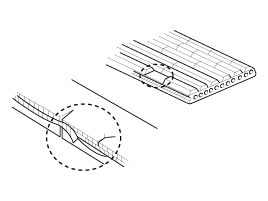Visually check the belt for excessive wear, frayed cords etc.
If any defect has been found, replace the drive belt.
If the belt is cracked on the side, consider if it is available. But if a chunk fall off from the belt, it should be replaced.

Check belt for maintenance and abnormal wear of V-ribbed part. Replace if necessary.
Do not bend, twist or turn the drive belt inside out.
Do not allow the drive belt to come into contact with oil, water and steam.
Visually check the belt for excessive wear, frayed cords etc.
If any defect has been found, replace the drive belt.
If the belt is cracked on the side, consider if it is available. But if a chunk fall off from the belt, it should be replaced.

Measure the belt tension using a mechanical tension gauge or a sonic tension meter. Adjust if necessary.
Belt tension
New belt : 637.4 ~ 735.5 N (65 ~ 75 kgf, 143.3 ~ 165.3 lbf)
Used belt : 441.3 ~ 539.4 N (45 ~ 55 kgf, 99.2 ~ 121.3 lbf)
Belt tension
New belt : 686.5 ~ 784.5N (70 ~ 80kg, 154.3 ~ 176.4lb)
Used belt : 490.3 ~ 588.4N (50 ~ 60kg, 110.2 ~ 132.3lb)
If the engine has run for 5 minutes or more, the belt tension must be adjusted as a used belt.
When installing the V-ribbed belt, all grooves on the pulley should be covered with belt ribs.
A loose belt causes slip noise.
Too tight belt cause bearing of alternator and water pump to damage.
(Refer to Timing System - "Dreve Belt")